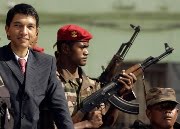The world’s fourth largest island faced another jolt in its already unstable political infrastructure as Madagascar’s army thwarted a coup attempt to overthrow President Andry Rajoelina. On November 20, Malagasy military descended upon barracks that housed dissident officers which ended a four day stand-off.
Political analysts have long said that the leader of Madagascar is only a figure head with the military behind any major governmental decisions.
In early 2009, Rajoelina – formerly mayor of the country’s capital city Antananarivo – led a successful coup ousting former president Marc Ravalomanana. A power sharing deal was struck in August 2009 with a national unity government being set up which will be comprised of a prime minister, three deputy first ministers, and 28 members. However, dreams of Rajoelina and Ravalomanana working together diminished as the former president was forced into exile. Another former president, Albert Zafy, was reported to have supported the rebels and called for 26-year old Rajoelina to resign.
As a result of its political manueverings over the past few years, the island nation has experienced international backlash, particularly from the US, the country that provides the most amount of international aid. US president Barack Obama terminated trade with Madagascar, as well as Guinea and Niger, saying that the countries had failed to make "continual progress" in meeting US requirements for the African Growth and Opportunity Act (AGOA).
The failed coup came during a referendum on a new draft constitution that would lower the minimum age for the country’s presidency to 35.
Reuters reported that France’s foreign ministry said a military coup would only deepen the former French colony’s political crisis.
Are you ready for 2010’s final edition of Alternative Energy

